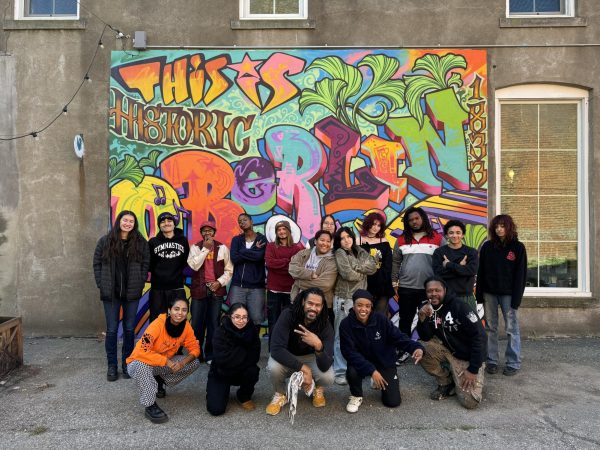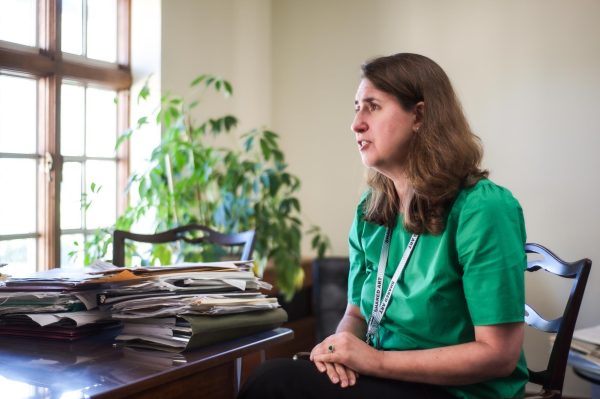Obies Create Inclusive Dating App for Long-Term Relationships
Imagine an online dating app that doesn’t show you a person’s photo at first. Instead, you match with the other person based on compatibility — only then does the app reveal users’ photos to one another.
Paire, an online dating app for Oberlin students that is currently searching for beta testers, will function exactly this way. It differs from most mainstream dating apps in that it is designed for people of all genders and sexualities looking for relationships — not hookups — based on personality, rather than appearance.
College second-year Kabir Karamchandani, a Computer Science and Creative Writing major, is one of the main founders of Paire. Over Winter Term 2020, they built a team and started coding. The group is still programming the app and is expected to release a demo video around Valentine’s Day.
Ishaan Thota, College second-year and Biology and Computer Science major and a member of the Paire team, explained what the interface will look like.
“[The app] intends to be very personal, and once you [look] at a potential partner’s pro le and you’re absolutely sure… you’re attracted to their person and character, then we’ll let you see a picture,” Thota said.
Because the user pro le will be highly personalized, users can answer close-ended questions, such as, “I don’t use substances.” There are also open-ended questions such as, “What does a relationship look like for you?” and “What does physical intimacy look like for you?”
Paire team member Parker Swanson, a College second-year Math and Computer Science major, noted that appearances alone could not sustain a healthy, long-term relationship.
“It seems that a lot of dating apps are trying to target college-age[d] students or younger people in general,” Swanson said. “They are a lot more based on appearances and trying to hook up with people than they are about trying to find people to date who you’ll probably connect with on a more personal level. In general long-term relationships, appearance can be important, but there’s more to it than just, ‘Here’s the picture of the person.’”
Recent research proves online dating apps’ rising popularity in the U.S. According to a Pew Research Center study published in Feb. 2020, 30 percent of U.S. adults have used a dating site or app — almost triple 2013’s rate of 11 percent. Moreover, compared to heterosexuals, nearly twice the number of lesbian, gay and bisexual adults have used a dating platform — 55 percent of non-straight people versus 28 percent of straight people.
Despite the popularity of dating apps in the LGB community, the Paire team believes that current dating apps are not providing enough for the diverse variety of individuals using them, such as those prioritizing hookups over relationships. The team thinks that there are two prominent issues with almost all dating apps available on the market: fixed gender options and appearance-based matches. As the Paire team asserts, sexuality and gender are spectrums. When designing the app, the Paire creators sought to provide more options for gender and sexuality.
“When you’re identifying for pairing purposes, [apps ask], ‘Are you interested in male, female? Are you male, female?’ — we don’t do that,” Karamchandani explained. “We’re still left with limited categories, but so far we’ve gotten [people who are] interested in male, female, or nonbinary [individuals]. I understand some people, [such as] asexual spectrum individuals, could just not use other dating apps because there was this expectation on them [to express affection sexually], whereas our dating app tries to do better in that regard.”
Online dating apps are a multibillion-dollar industry. Match Group, the owner of Tinder, OkCupid, and Hinge, released its 2019 fourth-quarter results. They showed that Tinder’s direct revenue exceeded $1.1 billion, a 43 percent increase over the previous year. The total revenue of the group exceeded $2 billion.
However, the Pew Research Center study also states that “Americans who have used a dating site or app in the past year say their recent experience left them feeling more frustrated, 45 percent, than hopeful, 28 percent.” Given that nearly half of all online dating app users say they felt frustrated, it is clear that we must re-examine our online dating culture. Paire is trying to serve as a platform that advocates for a better online dating environment, and it continues to make us ponder what relationships really are about.
Still, the idea of matching based on personal compatibility rather than simply appearance is not novel, and Paire faces many potential competitors that help match people based on their answers to a list of questions. However, the team members pointed out that those apps often ask you to pay to get premium features: for example, users can set up certain lters for free, but must pay to use more.
“When [fewer] people use these premium features, it makes the app worse for everyone because then everyone is only seeing pictures,” Karamchandani said.
Paire will not have any add-on charges for additional features, as the app is designed to help people find meaningful relationships — free of charge.
People using dating apps only for hookups is quite the elephant in the room, but Paire does not ban any user who wants to use the app for that purpose. The team members have nothing against people who seek hookups through dating apps, but they wanted to create a more accessible space for people who are speci cally interested in pursuing a relationship.
“Our hope is that everyone who you run into on our app, or at the very least, most of the people you run into, are people who are interested in long-term relationships,” Swanson said.







